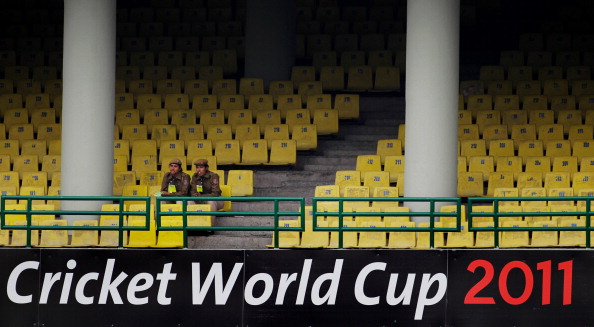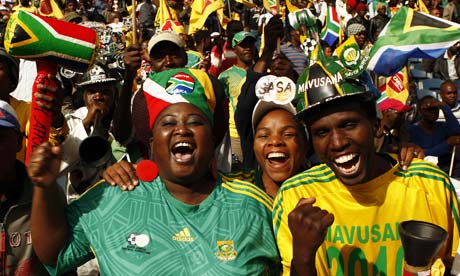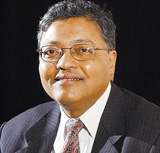Given how these organisations see themselves as accountable to nobody but themselves, and this in an era when the cry of democracy and transparency cannot even be resisted by Arab despots, this may seem a ridiculous question.
Yet I am inclined to raise it because of how different the Cricket World Cup in India is turning out compared to the Football World Cup in South Africa.
I have been struck by this comparison in the past week as I have travelled in India following the 50-over cricket tournament.
It is widely accepted that the World Cup in South Africa was a very well organised affair.
I am sure the London Olympics will provide a similar, if not better show.
India, in contrast, has demonstrated for the second times in six months how not to organise a world event.
It boils down to control. Both FIFA and IOC exercise iron control over their events.
Neither the Commonwealth Games Federation, nor the International Cricket Council have such powers.
It has meant the Indians have been left to their own devises and they have brewed quite a horlicks.
We all know the appalling problems of last October’s Commonwealth Games, both in the run-up and during it.
This included the shambolic way the Indians prepared for the Games, with the media exposing shocking living conditions for athletes just days before the Games were due to begin.
Then there were ticketing problems, with Indian officials insisting venues were sold out, yet most events were held with hardly anyone present.
It was as if, having bought tickets, spectators were stubbornly refusing to come and watch the sports.
The Commonwealth Games Federation was an impotent bystander as these events unfolded, saying it had none of the resources that the IOC has.
India did try and redeem itself as the Games commenced, but its end has not meant the end of the Indian misery.
The shadow cast by the allegations of corruption is so large that, with the arrest last week of two more officials of the Organising Committee, the entire leadership of the Games, barring the chairman Suresh Kalmadi, is now behind bars.
All the indications are that Central Bureau of Investigation, the Indian FBI, has far from completed its task and the Indian media freely speculates about how many more may be arrested.
While there is no suggestion of sleaze at this World Cup, ticketing has again been a huge problem.

This time, the on-line system has proved so wretched that fans who had bought tickets six months ago have still not received them.
Even the commercial partners of the International Cricket Council have not received their tickets.
The most unedifying moments for the Indians came last Thursday as spectators queued at the box office for tickets for Sunday’s India-England match in Bangalore.
Instead of officials asking for credit cards or cash, they found policemen carrying lathis, batons, and were given quite a beating.
The Bangalore City Police Commissioner, Shankar Bidri, for good measure, defended his men in words that might have been borrowed by the Americans defending their action of destroying a village during the Vietnam War.
He said: “People were crawling over each other; there was a likelihood of a stampede. To prevent a greater injury, you have to cause a small injury.”
Contrast this with South Africa last summer where FIFA had the sort of control a Government may envy.
In South Africa, FIFA behaved as if it was the almighty Vatican of sport. It was clear to anyone who followed the tournament that this was a completely FIFA run operation.
FIFA had allowed South Africa to use its World Cup franchise, but FIFA was running the show.
In effect, for the South African World Cup, FIFA moved its offices from Zurich to Johannesburg and other cities of South Africa, and controlled every aspect of the World Cup down to the ticketing. Locals on the ground had very limited input into the whole thing.

Indeed, on certain issues, FIFA succeeded in having a status even higher than that of the South African Government, bending it to its will for the competition.
So, as part of the price for hosting the World Cup, the South African Government was forced to amend its laws.
This meant that those who committed football related offences were tried quickly. In a country where it can take years for a case to come to court, such football related offences came to court in matter of weeks.
FIFA made it clear it was this was price South Africa had to pay to receive this unique sports brand.
So pervasive were FIFA controls that they resulted in a leading South African saying he felt the World Cup meant FIFA had occupied his country.
Strong words, but it reflected the feelings of many in that country. But so desperate was South Africa to host the competition, that it was prepared to pay any price.
It knew this was not a permanent occupation like that of bygone colonial powers.
After all, what were a few weeks of misery for the eternal glory of becoming the first country in Africa to host the tournament?
The 2012 London Olympics will not see quite such oppressive IOC control. But they have seen legislation to make sure that ambush marketing regarding use of the IOC symbols, such as the rings, or anything connected with the word Olympics, however remotely, is punishable by law.
In addition, London will have to prepare itself to receive the Games. This includes giving the IOC a “clean city”, so that there are no rivals to the IOC and its sponsors and also having Olympic lanes during the Games to facilitate transport for the Olympic family.
The ICC can exercise nothing like this sort of control over this World Cup or, for that matter, international cricket in general.
This lack of control was brutally revealed when, a day after the tournament began, David Becker, head of the ICC’s legal department, wrote a letter to Sharad Pawar, chairman of the central Organising Committee.
The letter warned the Indians not to try and sell tickets at the box office as there could be “chaos and physical injury”, a warning the organisers in Bangalore clearly ignored.
It also expressed the fear that relationships with sponsors were at “breaking point.” So bad, indeed, that they might demand some of their money back.
Given that Pawar is also President of the ICC, and therefore Becker’s boss, the letter was unprecedented.
The World Cup may be the ICC World Cup, just as the South African World Cup was the FIFA World Cup as FIFA never stopped reminding us, but, unlike the football variety, this is not a franchise operation.
On the ground, the Indian feudal cricket barons run their own stadiums and grounds much as they do normally. The ICC can complain and wring its hands but, unlike FIFA, it cannot bend Indian cricket, let alone Indian government, to its will.
Of course, it is complicated in cricket in that the ICC, with its English origins, does not control world cricket in the same way that Fifa, which was set up by the French, controls world football.
Also, the Indians are the economic powerhouse of the game. They contribute 80 per cent of world cricket income through television fees earned from the huge market provided by their 1.3 billion cricket mad population. And world cricket could not function without Indian money.
What is even more fascinating is how Indians react to foreign criticism.
Their defence is that India has its own way of doing things and the world does not understand. So the Bangalore police commissioner said: “The Indian situation is very different. It is very difficult for people in America and Europe to understand.”
This was almost a repeat of the line taken by the Commonwealth Games official, Lalit Bhanot, now behind bars.
When asked about the lack of hygiene in the village he uttered the immortal line that hygiene standards in India were different to those in the West.
So what would you have? A FIFA style totalitarian control of an event, or an ICC laissez-faire system?
South Africa could argue that the World Cup has boosted its image.
In contrast, India with an economy that is growing at 10 per cent a year and an acknowledged power, has seen two successive sporting events tarnish its shiny, new-India image.
The conclusion seems obvious. If you are going to use sport to boost your image, make sure it is a tightly controlled operation.
Otherwise, like India, far from doing any good, it may harm the country. But then again, if India wins the Cricket World Cup for the first time since 1983, it will not care what the world thinks.
Mihir Bose is one of the world’s most astute observers on politics in sport and, particularly, football. He formerly wrote for The Sunday Times and The Daily Telegraph and until recently was the BBC’s head sports editor.

